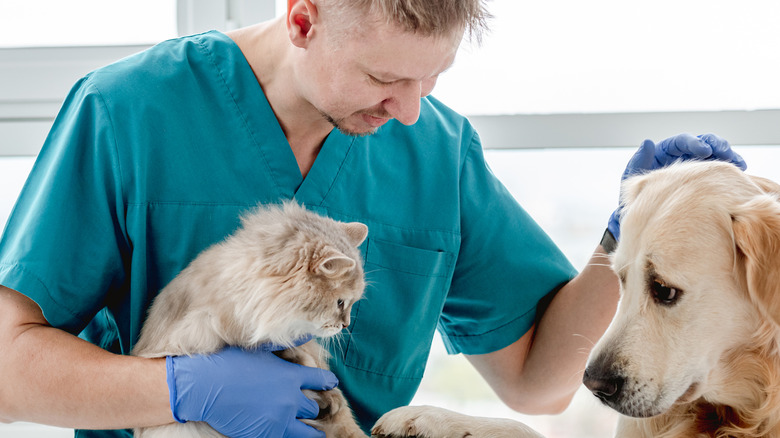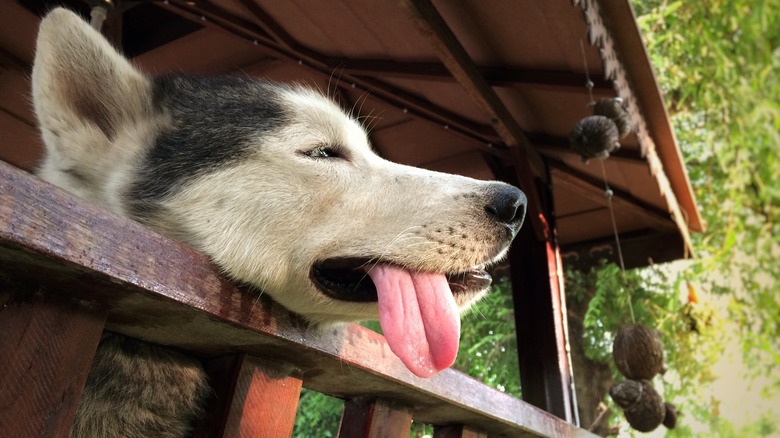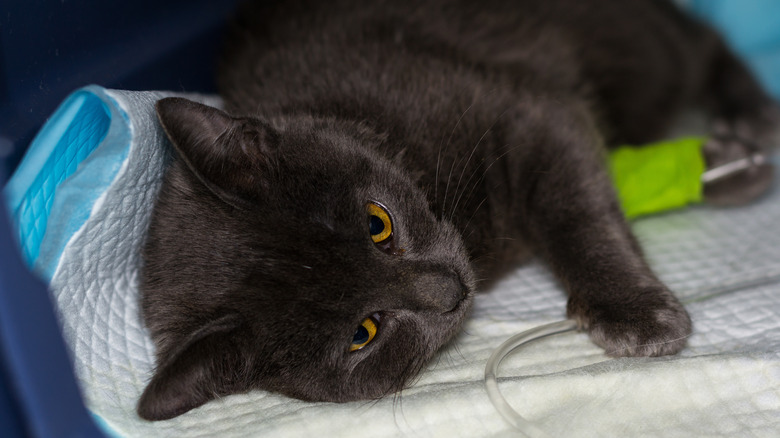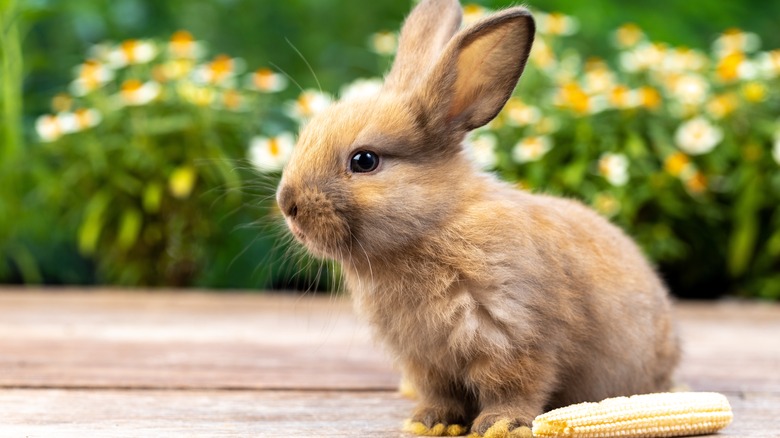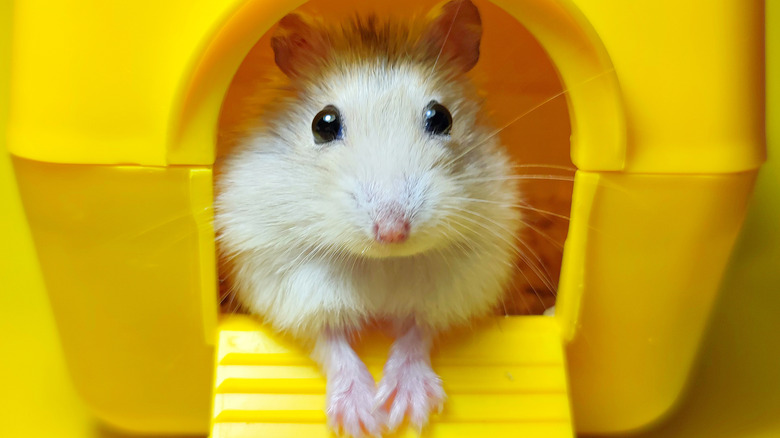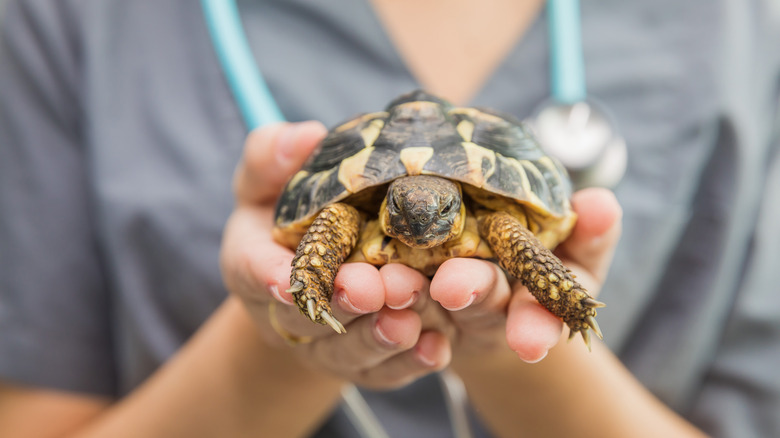How To Tell If Your Pet Is Dehydrated
As a pet owner, you naturally want to take the best care of your pet as you can since they bring so many benefits to our lives. Many owners obsess over picking the right food, but drinking enough water is just as, if not more, important. Unlike humans, pets can't tell you when they don't feel well. They may just sleep through symptoms, making it more difficult for owners to recognize that anything is wrong (via PetMD).
Dehydration takes a toll on the body, including in humans, animals, and even plants. It causes an electrolyte imbalance, per Medical News Today. Electrolytes manage muscles and nerves which is why when dehydrated, the body starts to feel weak. Proper hydration also keeps the heart functioning normally. Dehydration causes the heart to pump faster and work harder because blood thickens simply from not having enough water in the body. In severe cases, this can result in a stroke or heart attack.
All pets need to be properly hydrated, but depending on what type of pets you have, you'll need to look for different signs of dehydration.
Is your dog dehydrated?
It isn't always easy to tell if your dog is dehydrated. Dogs don't always exhibit obvious signs, and you may not always see whether your pup is consuming enough water. Still, dehydration can be serious or even life-threatening for dogs, per PetMD. Without sufficient hydration, your dog's body won't work efficiently. Their electrolytes can be compromised, their kidneys may shut down, and their waste may build up. That's when your dog needs emergency help, according to Veterinary Emergency Group.
The causes of dehydration in dogs are varied. Like humans, they can quickly become dehydrated in the warm summer months. There are also medical situations where pets can quickly become dehydrated, either because their body isn't filtering liquid properly or simply because the pet isn't drinking due to illness. These include heatstroke, fever, gastrointestinal illness, and kidney disease (via PetMD).
If you aren't sure if your dog is drinking enough, you can look for outward signs of dehydration. Your dog may stop eating and have dry gums and thick saliva. According to Fetch by WebMD, for every pound they weigh, dogs need to consume at least 1 ounce of water daily. A quick way to figure that out is if your dog is 40 pounds, they need 40 ounces of water. Similarly, 10-pound dogs need at least 10 ounces of water everyday. If you have one dog, you can measure their water by ounces, pour the water into their bowl, and then see how much is leftover at the end of the day.
Signs of dehydration in cats
Like dogs, the signs of dehydration in cats can be subtle, and you may not know if your cat is drinking enough water. Sometimes, even in humans, you may not always be aware that you're dehydrated. With mild dehydration, PetMD says you may notice that your cat is sleeping more often. Not having enough fluid in their body will cause lethargy. Another way to determine your cat's hydration is to inspect their nose and mouth. A dry nose and sticky gums are other signs that you cat may not be drinking enough.
In cats, you may also notice their litter box is staying dry, though this can be difficult to notice if you have more than one cat. Cats may begin vomiting and have diarrhea and sunken eyes when dehydration becomes severe. The skin tenting test works for cats, so pinch up the skin on their back between their shoulder blade, and see how quickly it bounces back. Also, like dogs, cats may pant excessively when dehydrated.
If you notice your cat acting unusual, a visit to the vet is always helpful.
Dehydration in pet rabbits is a serious issue
Rabbits have been a popular pet for a few centuries, with everyone seeing not only how cute they are but also what good company they make (via The Healthy Pet Club). However, they do require a certain amount of specific care. Though dehydration in any pet is a cause for concern, when rabbits get dehydrated, it can be deadly very quickly. According to Rabbit Care Tips, if rabbits go without drinking water for just 24 hours, they can die.
The most common cause of dehydration in rabbits is diarrhea, so if your rabbit has a stomach issue, it's vital to make sure they are drinking regularly. Rabbits can quickly develop gastrointestinal stasis, too, which means that their intestines slow down and stop pushing food properly through the intestinal tract. This can be caused very quickly if a rabbit doesn't drink for 12 hours (via the House Rabbit Society).
Signs of dehydration in rabbits include loss of appetite, wrinkled skin, dark urine that has a foul odor, and lack of energy. On average, rabbits drink a lot of water, and most need as much water as a small dog (via The Bunny Lady). The larger the rabbit, the more water they need. During the summer or whenever it's hot out, rabbits need more water than usual.
Hamsters can get dehydrated, too
With pet hamsters, there are certain advantages in regulating and recording their water intake. Since their habitats are mostly controlled, you can keep the room temperature at a healthy level, which prevents hamsters from overheating and becoming dehydrated. You can also clearly see how much they are drinking from their water bottle. Yet, once hamsters become dehydrated, it can be a life or death situation in just a few days (via PawTracks).
Signs of dehydration in hamsters can be even more subtle than in other pets. They will seem lethargic and tend to stay in a corner, or generally one spot in their habitat (via First Hamster). Their skin can look wrinkled and dry. Again, you can employ the skin tenting method to see how quickly their skin snaps back into place after being pulled up on their upper back. Also, since hamsters quickly lose water weight from dehydration, they may seem to look thinner or smaller.
If you notice your hamster isn't drinking, change its water, and try to get them to take some sips or use a dropper to place some water in the mouths. If they continue to not drink, they will need to be seen by a vet.
How to recognize if your turtle is dehydrated
You might think that turtles can go without water for a while, but that's not the case with pet turtles. Turtles need daily fresh water to keep their bodies running well, and to prevent illness. The most apparent and first sign of dehydration in turtles in sunken eyes (via Turtle Owner). If dehydration becomes severe, turtles may keep their eyes entirely closed.
Other signs of dehydration in turtles are lethargy, little movement, inadequate muscle tone (check this by gently tugging a leg toward you and see how quickly they snap it back under their shell, it should be immediate, not slow), wrinkled skin, dry skin, and dry feces. They may also stop eating. One way to incorporate more water into their diet is to feed them water-based veggies. You can also spray the vegetables with water before you offer it to your turtle.
Dehydration can quickly turn serious, and your pets may have an underlying health condition that is affecting their normal habits and behavior. When pets act differently than they normally do, they should always be checked out by your vet.
